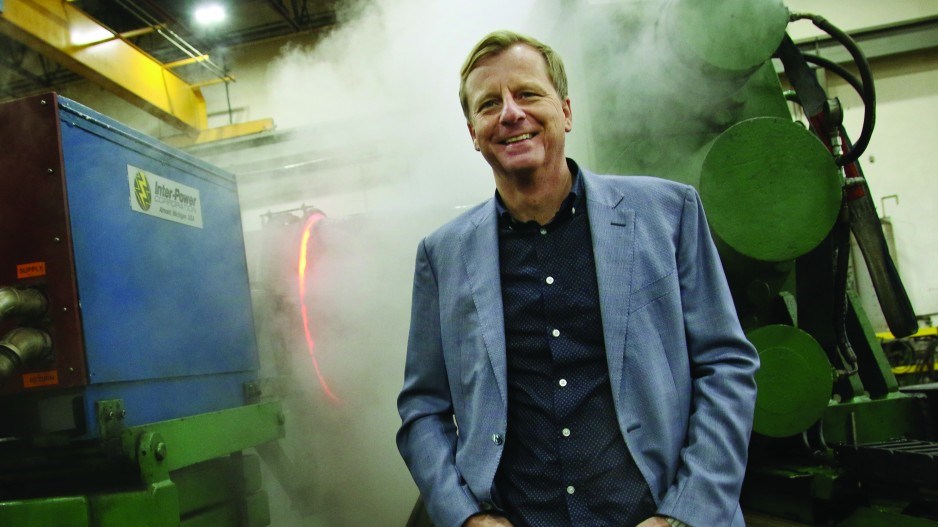Canadian politicians like to talk up the opportunities that the low-carbon economy will provide for Canadian innovators.
For AdvanTec Global Innovations, the growing clean-tech industry has indeed been good for business. The sector accounts for about 40% of the specialized manufacturing company’s business.
But as is often the case with Canadian clean-tech companies, there actually isn’t much of a market for some of AdvanTec’s products and services in Canada, where the products are made.
The hydrogen fuel reformers it manufactures, for example – devices that turn natural gas into hydrogen for fuel cells – go mostly to South Korea.
And while AdvanTec benefited from one clean-energy project in B.C. – the Site C dam project – and has high hopes for the new CleanBC plan, a new liquefied natural gas (LNG) industry that held so much promise has so far been a disappointment.
“We’re hoping we’re going to get some work out of the LNG plants, although, sadly, so far that looks like it’s all going to China,” said AdvanTec founder and president Brad Miller.
Miller is a mechanical technologist and serial entrepreneur who, over the past two decades, has twice expanded small specialized manufacturing companies into $100 million enterprises.
Twenty years ago, he bought a small company called IMW Industries Ltd., and in 2010 he sold it to Clean Energy Fuels Corp. (Nasdaq:CLNE) in California for $125 million.
He then went on to build AdvanTec into another multimillion-dollar company. AdvanTec performs specialized manufacturing, with three main business divisions – the marine sector, heavy industry and clean tech.
Headquartered in Langley, AdvanTec now owns and operates four manufacturing plants in Canada – three in B.C. and one in Calgary – and three in the U.S. Its B.C. plants are in Maple Ridge, Langley and Chilliwack.
AdvanTec now has a global head count of 600 – with about 450 workers in Canada – and annual sales of $80 million to $100 million. That’s a 10-fold increase in size since Miller founded the company a decade ago.
The company’s marine business, AdvanTec Marine, makes specialized equipment and components including the closures for windows, doors and hatches on boats. It has benefited from Canada’s National Shipbuilding Strategy.
“We’re getting a piece of that as well, which is great,” Miller said.
But the U.S. also is a growing market for its marine-sector business, so Miller recently opened a new manufacturing plant in Alabama – a move he said was “eye-opening.”
“We have a lot of customers in the Gulf Coast, so it made sense to be close,” he said. “It’s interesting to move into a lower-labour-cost, business-friendly jurisdiction like that to see how happy they are to have people like us.”
While the cost of operating may be higher in B.C., he said there are some advantages. One is proximity to Asia, which is a growing market for some of the clean-tech equipment AdvanTec makes. B.C. also has a well-educated, skilled workforce and a thriving clean-tech startup ecosystem.
On the heavy industry side of AdvanTec’s business, AdvanTec Industrial specializes in things like fabrication of pressure vessels and heat exchangers, and pipe bending.
“They do everything from pipeline work to roller-coaster tracks to pedestrian bridges,” Miller said. “We’re very specialized. We ship that all over North America.”
On the clean-tech side, AdvanTec makes reformers for stationary hydrogen fuel cell power generators. The company is also developing hydrogen fuelling station equipment.
Miller laments that there has been so little demand for hydrogen fuel cell technology in Canada. After all, this country has an abundance of natural gas, from which most hydrogen is made, and Vancouver is a fuel cell innovation hub.
Of the 300 reformers the company has built and sold, 15% were sold in North America, but not one of them was sold in Canada.
“We talk a good story, but when it comes to actually implementing technology and creating programs that support companies like ours, we seem to be short on delivery,” Miller said.
One area where the company may see some domestic demand is in its biogas scrubbers. The company manufacturers equipment that removes impurities from landfill gas.
The provincial government’s new CleanBC plan could mean more demand for that equipment, since it includes new standards that will require 15% of B.C. natural gas to have a renewable fuel content. That will mean an increased demand for biogas.
“It’s a good opportunity, for sure,” Miller said of the CleanBC plan. “It fits right in with our core competencies.”
As for B.C.’s newest industry – LNG – Miller had hoped to see some opportunities for his company as well as other Canadian manufacturers. But the large modules that will be used for the LNG Canada and Woodfibre LNG plants will be manufactured in Asia.
Miller concedes that Canadian manufacturers like his company don’t have the capacity to build some of the large LNG modules. But there are some components and equipment that Miller said companies like his could build, if they had a chance to bid.
“We’re not the only company in B.C. or Alberta that could very effectively support that and, I think, compete,” Miller said. “So far we’re not even getting the opportunity to submit any pricing on it. So we don’t even know if we’re competitive.”




